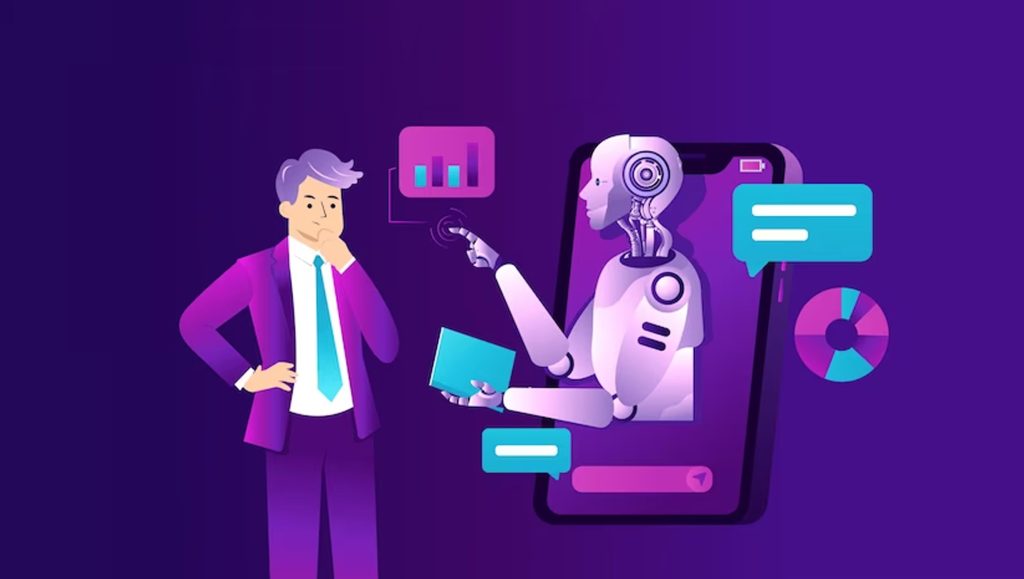The connection between Generative AI and customer service is becoming more obvious in today’s digital landscape. The introduction of advanced AI systems, such as ChatGPT, has spurred debate regarding the impact of these technologies on our systems, as well as the future of jobs and mankind.
Generative AI systems, such as ChatGPT, may generate content such as text and images, and conversational tasks that closely resemble human-generated content. This technical innovation raises serious concerns about the integrity and ramifications of artificial intelligence in customer service.
Relationship Between Generative AI and Customer Service:
In today’s digital landscape, AI and customer service have a significant relationship. Generative AI refers to artificial intelligence systems and when applied to customer service, it plays a pivotal role in transforming and enhancing customer experience.
So, what exactly does it do? Businesses can use generative AI to automate customer interactions and support procedures. Let’s see how:
- Automation offers supreme customer support: Because the chatbots are driven by Generative AI, consumer queries are answered professionally and quickly. It helps customers via a variety of self-service options. Automation saves time for both consumers and support employees, leads to faster query resolution, and improves overall efficiency.
- Personalized customer interactions: Secondly, Generative AI helps in personalizing the customer interactions and by analyzing a vast amount of data AI algorithms are able to understand individual preferences, historical interactions and behavior patterns. This information is useful for businesses to deliver personal recommendations, tailored offers and proactive support thereby creating a very satisfying and engaging customer experience.
- Consistent and accurate responses: Furthermore, generative AI improves the quality of customer service personnel in real time. During customer interactions, it aids in the provision of relevant responses, insights, and information. This enables AI-powered systems to give accurate and consistent responses, reducing errors and inconsistencies in customer assistance.
- Improved customer satisfaction: Furthermore, generative AI can provide real-time assistance to customer support employees. During interactions with clients, it can advise appropriate responses, provide information, and provide insights. This enhanced intelligence empowers support employees, allowing them to provide more efficient and effective assistance, resulting in happier customers.
AI has come a long way in a few short years, progressing from simple chatbots to complicated artificially intelligent networks. As a result, things that seemed unthinkable or unachievable at one point in time, such as generating human-like responses on a vast scale, are now possible.
AI developments have made investing in AI more appealing. This is confirmed by the fact that 91% of prominent organizations have ongoing AI investments and intend to raise their efforts.
AI has the ability to drastically improve various aspects of life, work, and customer interactions. It helps with improving product and service quality, automating operations, personalizing customer interactions, and enabling new solutions. These breakthroughs make artificial intelligence an intriguing investment option for corporations.
Concerns regarding AI and customer service:
Though there are many benefits of Generative AI, there are many concerns about the potential power and ramifications of AI tools. The ability of generative AI to generate fresh content faces some hazards. These hazards include the propagation of misinformation, deepfake technology, and potential ethical concerns around the usage of AI.
When considering the future of AI and customer experience, it is critical to know that it is not an easy road. While AI has enormous potential, it also necessitates careful management to prevent dangers and ensure responsible use. Businesses and organizations must manage these hurdles and establish a balance between using AI’s strengths and resolving possible disadvantages to ensure great customer experiences and overall societal benefits.
While artificial intelligence has enormous chances to improve our lives and work, it is critical to recognize and prepare for its potential negative implications.
The worry of job loss is a prevalent concern in the AI community. As AI technology progresses, there is concern that automation will eventually replace human employment in a variety of areas. However, the fears about AI extend beyond job displacement. Some industry leaders have raised concern about the possible threats posed by bad actors who may exploit AI for destructive reasons. There is also a long-term concern about giving AI systems too much power, which could have unintended effects for humanity.
The declaration mentions a number of specific hazards related with AI. These include worries about customer privacy, biased programming, physical safety, and a lack of clear laws. If not properly controlled, AI systems may jeopardize personal privacy, promote bias and discrimination, pose physical risks, and potentially endanger human liberties.
Moral governance must exist to ensure the proper development and deployment of AI. Setting norms, legislation, and ethical frameworks to control AI applications and reduce any risks is part of this process. Maintaining the human factor in AI systems is also critical. Instead than replacing humans, AI should empower them, allowing them to realize their potential and augment their capabilities.
While AI has a lot of promise, it is critical to be aware of and handle its possible downsides. We can navigate the path of AI development in a way that promotes the greater good while limiting risks by instituting moral governance and ensuring the human element stays paramount.
Impact and Future Trends regarding generative AI and Customer Service
Generative AI has the ability to drastically alter customer service and is already influencing how companies interact with their customers. Generative AI refers to AI systems that may create new content, such as text, photos, or videos, based on patterns and examples learned. Here are some examples of how generative AI is influencing customer service and future trends in this field:
-
Personalized customer interactions:
Personalized customer interactions will remain an important trend in customer service in the future, spurred by advances in generative AI. Here are some examples of how individualized customer encounters may be impacted, as well as some new trends in this area:
- Improved Natural Language Processing: Chatbots driven by generative AI will grow more intelligent in interpreting and responding to client enquiries. They will be able to analyze context, tone, and intent, which will allow them to provide more accurate and relevant responses. This powerful natural language processing capacity will help to make interactions more personalized and human-like.
- Understanding Context: Future generative AI systems will be able to comprehend the broader context of consumer dialogues. They will be able to recall earlier interactions and use that information to make more personalized recommendations and solutions.
- Predictive Personalization: Generative AI will forecast client wants and preferences using data analytics and machine learning approaches. AI systems will anticipate client requirements and make proactive recommendations or solutions by studying past behavior, purchasing history, and demographic information. Customers will save time and effort by receiving appropriate suggestions before they ever ask for them, thanks to predictive personalisation.
- Emotional Intelligence: Future generative AI systems will be able to recognize and respond to the emotions of customers. They will assess consumer mood by analyzing speech patterns, attitude, and nonverbal indicators, and then modify their responses accordingly. Businesses will be able to empathize with clients and give more personalized and compassionate help as a result of this emotional intelligence.
- Continuous Learning and Adaptation: Through machine learning techniques, generative AI systems will continue to learn and develop over time. They will change to accommodate changing client preferences and behaviors, ensuring continuous customisation. Businesses will be able to stay relevant and create tailored experiences that match changing client needs through continuous learning and adaptation.
- Privacy and Data Protection: As personalisation increases, so does the need for strong privacy and data protection safeguards. To develop trust, businesses must emphasize consumer data protection, openness, and consent. For the successful use of generative AI in consumer interactions, the correct balance of personalisation and privacy will be critical.
Finally, the breakthroughs of generative AI will determine the future of tailored customer interactions. Among the themes are improved natural language processing, contextual understanding, multichannel personalization, predictive personalization, emotional intelligence, continuous learning, and data privacy. These advancements will enable organizations to provide highly tailored, seamless, and engaging client experiences, resulting in increased customer satisfaction and loyalty.
-
Content Creation
Generative AI will aid in the creation of content for customer service. It can automate the generation of FAQ responses, the generation of product descriptions, and the creation of tailored interactions. This type of automation saves time and allows firms to scale their customer service more efficiently. Following are some ways it will benefit:
- Automated Response Generation: By evaluating massive volumes of data and learning from previous customer encounters, AI systems can generate correct and relevant responses in real-time.
- Personalized Communication: Based on client data and preferences, generative AI can generate personalized content such as personalized emails or messages. AI systems may design personalized communications that resonate with specific customers by leveraging customer profiles, purchase history, and behavior patterns. This tailored strategy boosts customer engagement and satisfaction.
- Dynamic Content Generation: For customer service, generative AI may generate dynamic and interactive material. AI-powered chatbots, for example, can provide dynamic responses that react to the context of a conversation. To effectively assist customers, they can provide step-by-step assistance, interactive forms, or graphic content. This dynamic content generation improves the customer experience and allows for a more thorough response to consumer requests.
- Localization of Language: Generative AI can assist firms in providing localized customer service content. AI systems can automatically translate and generate content in a variety of languages, allowing businesses to engage with customers in the language of their preference. This language localization capacity enables organizations to broaden their reach and appeal to a wider range of client segments.
- Quality Assurance: Generative AI can help ensure the consistency and quality of customer service content. AI systems can produce rules and suggestions for human content authors by evaluating trends and examples of high-quality content. This guidance aids in the maintenance of a consistent tone, style, and messaging across several customer support channels.
- Future advancements in generative AI may include the creation of multimodal content. This includes creating photos, videos, and audio files in addition to text-based material. To improve customer service interactions, AI systems can learn from existing multimedia information and generate new images or audio pieces. Multimodal content generation enriches and deepens consumer communications.
- Augmenting Human Creativity: Generative AI can be used to supplement human creativity in the development of content. It aids human content creators by automating basic and repetitive processes, freeing them up to focus on higher-value activities requiring human ingenuity, critical thinking, and emotional intelligence. AI and human collaboration results in more imaginative and effective content initiatives.
These advances in content generation will allow organizations to efficiently scale their customer support activities, create personalized and engaging experiences, and improve overall customer happiness.
Read More: SalesTechStar Interview with Olivier Gachot, CRO at LeanDNA
-
Virtual Assistants
Generative AI can empower virtual assistants to provide better customer service. These assistants help businesses evaluate consumer satisfaction levels and more by evaluating text-based inputs like reviews and social media comments. As technology advances, the virtual assistant will become more conversational and provide a more seamless user experience. A few more effects of future trends are listed below:
- Client Inquiry Handling: Generative AI-powered virtual assistants can successfully handle client inquiries and deliver timely responses. Natural language processing capabilities enable these AI-powered assistants to recognize and interpret consumer questions and requests. Virtual assistants can create relevant and accurate responses to client enquiries by detecting patterns and utilizing machine learning techniques.
- Personalized Recommendations: Generative AI enables virtual assistants to provide clients with personalized recommendations. The virtual assistant can generate customized suggestions and product recommendations by evaluating consumer data, purchasing history, and browsing behavior. These recommendations are personalized for each consumer, boosting the likelihood of customer happiness and engagement.
- Process Guidance: Virtual assistants can assist consumers with a variety of processes, such as product onboarding, troubleshooting, and order tracking. Virtual assistants can employ generative AI to generate step-by-step instructions or provide interactive guidance to help users execute tasks successfully. This assistance improves the user experience while decreasing the need for human intervention in routine tasks.
- Conversational Capabilities: As generative AI technology progresses, virtual assistants’ interactions can become more conversational and natural. They can hold back-and-forth dialogues with customers, comprehending context and responding appropriately. Because of its conversational skill, virtual assistants may imitate human-like interactions, resulting in a more personalized and engaging consumer experience.
- Continuous Learning and Improvement: Generative AI enables virtual assistants to learn and enhance their performance indefinitely. Virtual assistants can use machine learning algorithms to study client interactions, comments, and outcomes in order to improve their responses and recommendations over time. This recurrent learning process ensures that virtual assistants become more successful at addressing the needs of customers.
AI-powered virtual assistants contribute to a consistent and accurate customer experience across several channels and touchpoints. Customers can connect with the virtual assistant via a website, mobile app, voice assistant, or messaging platform, and the AI system maintains consistency in responses and comprehension. This provides a consistent and pleasant consumer experience.
-
Ethical Considerations:
As Generative AI becomes more advanced, ethical considerations will become more important. It is critical to ensure that AI systems do not generate biased or discriminating information. Businesses must exercise caution and set guidelines to avoid any inadvertent negative influence on customers. Let’s see how it affects future trends:
- Mitigation of Biases and Discrimination: Generative AI systems should be designed and taught with an emphasis on minimizing biases and discrimination. When picking training data, businesses and developers must exercise caution to ensure that it is diverse and representative. AI systems can be built to prevent producing biased or discriminating information by applying fairness measures and conducting regular audits. This is critical for avoiding unwanted consequences for people or groups. We will see that in future, this thing is considered when using Generative AI for customer service.
- Transparent and Explainable AI: Addressing ethical concerns will necessitate the transparency and explainability of generative AI systems. Businesses should aim to make AI systems more intelligible and provide insights into decision-making processes. This transparency fosters client trust by allowing them to comprehend the reasons behind AI-generated content or recommendations.
- Adhere to Customer data privacy and security: These are two ethical factors in customer service. Generative AI systems must follow privacy laws and safeguard sensitive client information. To avoid unauthorized access, abuse, or breaches of consumer data, businesses should employ strong security measures and data protection processes. Respecting the privacy of customers fosters trust and upholds ethical norms.
- Human Oversight and Involvement: While generative AI systems automate consumer interactions, human oversight and involvement remain critical for ethical issues. Human agents should be able to monitor and intervene in AI-generated responses as needed. This allows them to rectify any biases, inaccuracies, or sensitive circumstances that the AI system may not handle appropriately. Human engagement ensures responsible and ethical client service.
Addressing ethical considerations in generative AI for customer service has a huge influence. It enables organizations to interact with customers in an equitable and objective way, resulting in increased customer satisfaction and loyalty. Ethical AI practices foster trust and reputation, ensuring that organizations keep their ethical responsibilities while utilizing AI technology. Furthermore, ethical considerations contribute to a more inclusive and respectful customer service experience, which benefits customers from all walks of life.
Ethical considerations in generative AI for customer service have a significant impact on developing long-term customer connections and upholding ethical norms in AI-powered interactions.
Does this mean that the need of Human touch will be eliminated or minimized in the future?
This, however, will not be the case. We may understand this by looking at an organization called Intercom, a customer support company which underlines the need of quality assurance (QA) in AI-powered customer service and highlights the method followed by them. Here’s an overview of the main points:
- QA Process for AI-Powered Customer care: Intercom understands the importance of having a strong QA process in place when employing AI in customer care. The emphasis is on assessing the automated technology’s responses to ensure they are correct, relevant, and in line with the company’s standards. The issue, similar to controlling human responses, is in training the AI system to continuously produce the correct answers.
- Recognizing Mistakes in Humans and Technology: The statement stresses that both humans and technology can make mistakes. It implies that this is not a new phenomenon that requires the same amount of attention and care. The goal is to set appropriate boundaries and protocols to handle and effectively reduce any possible difficulties.
The statement introduces a shift in perspective from focusing solely on “quality assuring the agent” (individual support agents) to prioritizing the overall quality of the customer experience, regardless of whether it is delivered by a bot or a human. The emphasis is on satisfying industry and company standards, ensuring a high-quality experience for customers.
Overall, Intercom advocates applying rigorous quality assurance standards to AI-powered customer service, treating it with the same scrutiny as human responses. The goal is to define boundaries and rules to mitigate any concerns while prioritizing providing a high-quality client experience regardless of mode of distribution. Companies can maintain consistent quality in customer service by concentrating on the complete customer experience, whether through AI or human interactions.
Final Thoughts:
Understanding the relationship between Generative AI and customer service is crucial since numerous future trends will impact the way customer service departments operate. It has also brought many changes in the present, and the future will undoubtedly be altered as a result.
Using generative AI to improve customer satisfaction can provide you a competitive advantage in the market. Companies that use artificial intelligence to provide personalized, efficient, and consistent customer experiences are more likely to attract and keep customers. Businesses can separate themselves from competitors and develop a positive brand image by staying ahead of client expectations and providing outstanding service.Generative AI can help with problem solving and troubleshooting for customers. AI systems can spot patterns and offer effective solutions by analyzing data and employing machine learning techniques. This capacity enables firms to address customer issues more efficiently, resulting in better customer satisfaction and decreased consumer frustration.
As we can see, Generative AI and customer service impact and future trends are numerous, but maintaining the human aspect will be critical. Human support is essential when dealing with complex and emotionally charged challenges that clients face. Generative AI will undoubtedly empower human agents by providing them with the tools and insights they need to provide better customer service. It is changing the way customer support has been carried out in the past. Businesses, on the other hand, must be ethically conscious and establish a balance between AI-powered automation and the human touch in customer service interactions.
Read More: Elevating Women in Sales: A Path to Success and Inclusion





















